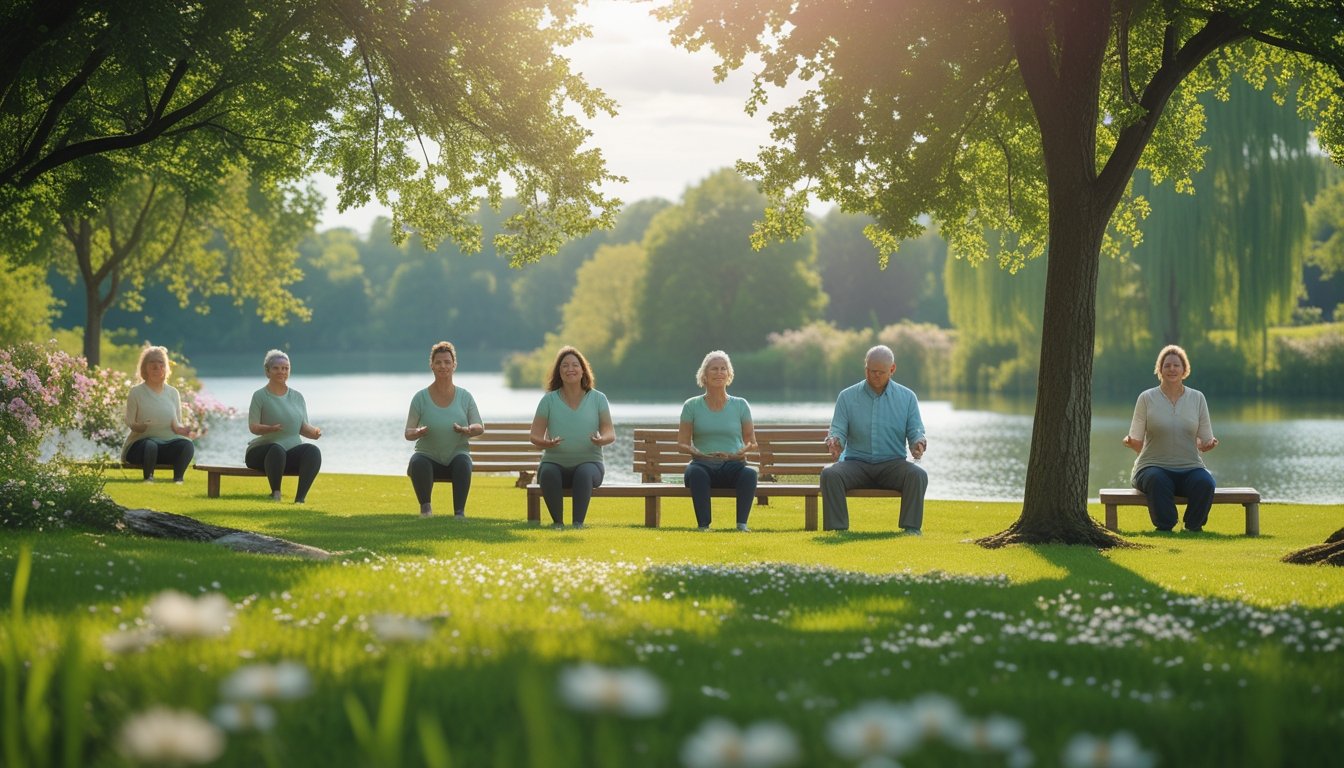Late updated: 15 May 2025 13:05
Written by: Ella Thompson
Exploring Eco-Therapy for Mental Wellbeing: Nature’s Healing Power
Eco-therapy, also known as nature therapy, is an emerging practice that focuses on harnessing the restorative powers of the natural environment to promote mental wellbeing. This type of therapy encompasses a variety of outdoor activities designed to reconnect individuals with nature, helping reduce stress and improve overall mental health. By facilitating a connection with the natural world, eco-therapy provides a unique pathway to enhance our psychological resilience and mental clarity.

Connecting with nature has proven benefits for mental wellbeing, offering a refreshing change from conventional therapeutic methods. From simply walking in a park to participating in structured nature-based programmes, these activities engage our senses and encourage mindfulness. They offer not just physical benefits but also serve as a bridge to achieving mental harmony and relaxation.
Incorporating eco-therapy into our lives can be a straightforward yet effective approach to maintaining mental health. As more understandings about eco-therapy unfold, we explore how these practices can be tailored to individual needs, delivering personalised benefits to our emotional and cognitive state. This blog post will guide you through the vital aspects of eco-therapy, its benefits, and answers to commonly pondered questions about its practice.
Key Takeaways
- Eco-therapy leverages nature for mental wellbeing improvement.
- Nature activities can reduce stress and enhance mental health.
- Personalised eco-therapy can suit individual mental health needs.
Understanding Eco-Therapy and Its Role in Mental Wellbeing
Eco-therapy involves activities in the natural environment aimed at improving mental health. This form of therapy stems from the belief that reconnecting with nature can offer therapeutic benefits and foster mental wellness.
What Is Eco-Therapy?
Eco-therapy, also known as nature therapy, is a therapeutic practice that integrates natural settings in the healing process. It operates on the premise that interaction with nature can enhance mental and emotional wellbeing. Unlike traditional psychotherapy that occurs in an office setting, eco-therapy utilises outdoor spaces. Activities may include gardening, hiking, and meditation in natural landscapes.
By engaging with nature, individuals can reduce stress and anxiety. Ecotherapy introduces ways to feel more connected to the natural world, often leading to improved mood and a greater sense of peace. Increasing time spent outdoors can strengthen mindfulness and provide opportunities for reflection, both crucial for emotional healing.
Core Principles and Techniques
Eco-therapy employs various techniques rooted in ecopsychology principles. A core element is fostering a deep connection with nature. This is achieved through guided exercises like mindful walking or meditation in woodlands. The practice encourages individuals to observe surroundings attentively, enhancing awareness of the present moment.
Hands-on approaches such as gardening allow one to experience the therapeutic benefits of working with plants. These activities not only encourage nurturing and responsibility but also promote relaxation and reduce symptoms of depression. Incorporating seasonal changes into sessions is another technique; it helps participants align with natural rhythms, offering insights into personal growth and emotional resilience.
Benefits and Applications of Eco-Therapy for Mental Health

Eco-therapy, also known as nature therapy, offers significant advantages for mental health. By integrating nature into healing practices, individuals can experience reductions in stress, enhanced emotional wellbeing, and improved physical health.
Reducing Stress and Alleviating Symptoms
Engaging in eco-therapy practices such as forest bathing or shinrin-yoku can significantly reduce stress levels and alleviate symptoms of anxiety and depression. The calming effects of natural spaces work through various mechanisms. Breathing in phytoncides from trees may boost our immune systems while reducing stress-related hormones like cortisol.
For those experiencing symptoms of bipolar disorder or other mood disorders, the consistency and routine of gardening offer stability. Activities like horticultural therapy utilise the repetitive, grounding nature of gardening. This encourages mindfulness and relieves persistent anxiety or restlessness.
Promoting Emotional and Social Wellbeing
Being connected to nature enhances emotional wellbeing by fostering a sense of compassion and reducing feelings of fear. Eco-therapy practices can create a bridge from social isolation to community engagement. By participating in group activities such as community gardening, individuals can build social connections, which are essential for emotional support.
Further, the ecology of natural spaces encourages empathy. As we grow more conscious of our environmental impact, we cultivate a deeper appreciation for the world around us. This reinforces a philosophy of care and responsibility towards both ourselves and our environment.
Boosting Physical Wellbeing Through Nature
Interacting with natural environments has several physical health benefits that overlap with mental health improvements. Regular exposure to green spaces is linked to increased physical activity, helping to improve cardiovascular health. Additionally, being in sunlight can enhance vitamin D levels, which is vital for bone health and mood regulation.
The simple act of walking through a forest or participating in outdoor activities contributes to building physical strength and stamina. By integrating physical movement with mental soothing exercises inherent in eco-therapy, we achieve a holistic approach that benefits our entire wellbeing.
Frequently Asked Questions

Ecotherapy emerges as a powerful tool to harness nature's benefits for mental health. This section addresses common queries about its techniques and potential challenges.
What are some practical examples of ecotherapy?
Practical examples include gardening, nature walks, meditation in natural settings, and animal-assisted therapy. These activities foster a connection with the environment, promoting mindfulness and relaxation.
What are the potential drawbacks of utilising ecotherapy?
While many find ecotherapy beneficial, it may not replace traditional therapies for everyone. Accessibility to outdoor spaces may be limited, and individuals with allergies or mobility issues might face challenges.
In what ways does nature therapy aid mental health?
Nature therapy alleviates stress and anxiety by promoting physical activity and mindfulness. Additionally, it encourages social interaction and provides a break from urban environments, helping to improve focus and mood.
Can you list some activities that are typically involved in ecotherapy?
Activities typically include hiking, birdwatching, conservation work, and forest bathing. Each activity aims to promote peace of mind and reinforce a positive connection with the natural world.
How can one receive certification in ecotherapy?
Certification typically involves completing specialised courses or training programmes offered by recognised institutions. These programmes often cover psychology, environmental science, and therapeutic techniques.
Where can I find ecotherapy sessions near my location?
Local nature reserves, community centres, or mental health organisations often offer ecotherapy sessions. Online directories and professional networks can also help locate certified eco-therapists in your area.
